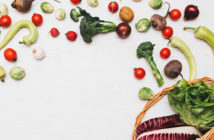Stay Healthy Mind Body & Smile
Eating a plant-based diet has so many health benefits. However, getting a balance of all the nutrients we need can be challenging. Zinc, an essential mineral, plays a key role in metabolism at the cellular level, immune health, wound healing, healthy gums and is required for proper sense and taste. It is found in higher concentrations in muscle, bone, semen and the prostate gland. Over 100 enzymes require zinc for catalytic activity. Our body’s do not have a storage system for zinc, so we have to make sure we intake zinc from our diets on a regular basis. Zinc deficiency is linked to slow growth in infants and children, delayed sexual development in adolescents and impotence in men. It also associated with hair loss, diarrhea, eye, and skin sores and loss of appetite.
People that over consume iron supplements suffer from gastrointestinal problems, as well as vegans and vegetarians, are at risk of being deficient in zinc.
How To Get Your Zinc In
In general, the amount of zinc available from vegetables is less than from meat. But scientists say zinc absorbed through plant-based is friendlier to the body than a diet heavy in animal-based products.
Vegetarians may require as much as 50% more of the RDA for zinc than non-vegetarians. The good news is you can certainly achieve adequate amounts of zinc without eating beef, poultry, liver, or fish where it’s so commonly found. There are many plant-based foods that are great sources of zinc.
Legumes and whole grains are an important part of the vegetarian diet. However, remember that legumes and whole grains contain phytates. Phytates have been shown to bind zinc and inhibit its absorption. Fortunately, there are techniques you can use increase the amount of zinc available from plant-based sources for your absorption and benefit.
- Soaking beans, grains, and seeds in water for several hours before cooking them and allowing them to sit after soaking until sprouts form.
- Vegetarians can also increase their zinc intake by eating more leavened grain products (such as bread) than unleavened products (such as crackers). Leavening will partially break down the phytate; thus, the body absorbs more zinc from leavened grains than unleavened grains.
- Be sure you soak your beans and legumes first or buy from brands that are pre-soaked. Then cook them thoroughly until they’re very soft.
These steps reduce the phytates, which also makes them easier to digest.
Yes You Can Get Too Much Zinc
Nausea, vomiting, loss of appetite, stomach cramps, diarrhea, and headaches can be signs of too much zinc. Consuming too much zinc long term may lead to low copper levels, low immunity and low levels of HDL (our good cholesterol). When people take too much zinc for a long time, they sometimes have problems such as low copper levels, lower immunity, and low levels of HDL cholesterol (the “good” cholesterol).
The upper limits for zinc are listed below. These levels do not apply to people who are taking zinc for medical reasons under the care of a doctor:
| Age | Male | Female | Pregnancy | Lactation |
| 0–6 months | 2 mg* | 2 mg* | ||
| 7–12 months | 3 mg | 3 mg | ||
| 1–3 years | 3 mg | 3 mg | ||
| 4–8 years | 5 mg | 5 mg | ||
| 9–13 years | 8 mg | 8 mg | ||
| 14–18 years | 11 mg | 9 mg | 12 mg | 13 mg |
| 19+ years | 11 mg | 8 mg | 11 mg | 12 mg |
* Adequate Intake (AI)
Source https://ods.od.nih.gov/factsheets/Zinc-HealthProfessional/
Be Cognizant
Zinc dietary supplements can interact or interfere with medicines that you take and, in some cases, medicines can lower zinc levels in the body.
Zinc is also found in some oral over-the-counter products, including those labeled as homeopathic medications for colds. Use of nasal sprays and gels that contain zinc has been associated with the loss of the sense of smell, in some cases long-lasting or permanent. Currently, these safety concerns have not been found to be associated with oral products containing zinc, such as cold lozenges.
Zinc is also present in some denture adhesive creams. Using large amounts of these products, well beyond recommended levels, could lead to excessive zinc intake and copper deficiency. This can cause neurological problems, including numbness and weakness in the arms and legs.
A healthy eating plan is the most effective way to get your zinc consistently.
Great Sources of Zinc:
Wheat Germ
Wheat germ is a great source of zinc. Wheat germ provides 17 mg of zinc per 100 gm serving. That is about 111% of the recommended daily allowance of this mineral. Just sprinkle it on your salads or enjoy it as a topping.
Oats
Oats are one of the few grains that offer a large amount of zinc.
Seeds
Pumpkin Seeds Besides being extremely high in zinc, pumpkin seeds help prevent prostate cancer and support a healthy immune system. A 100 gram serving of pumpkin seeds contains about 10.3 mg of zinc, contributing 69% daily value (DV) of this mineral. To obtain maximum zinc, it is advisable to eat them raw as roasting them can deplete the zinc content.
Per 100 grams serving – 10.3mg
Are extremely high in Zinc and best eaten raw as roasting them can deplete some of the zinc intakes.
Sesame Seeds
Sesame seeds are rich in zinc. Whether eaten raw, roasted or ground into tahini butter, a 100 gram serving of sesame seeds provides about 10 mg of zinc. You can get the benefits of sesame seeds by adding hummus into your diet. Hummus is great as a dip, sauce or as a side. You also swap out wheat flour with sesame flour for baking.
Nuts
Cashews, in particular, are rich in this mineral with 100 grams serving providing 5.6 mg or 37% DV of zinc. Other nuts containing zinc include pine nuts (12% DV), pecans, (9% DV), almonds, peanuts and walnuts (6% DV each) and hazelnuts (5% DV).
Cocoa Powder: 1 ounce: 1.9 milligrams (13 percent DV)
Just a bit of dark chocolate can greatly improve your zinc level. A 100 gram serving of unsweetened dark chocolate provides 9.6 mg of zinc. 100 grams of cocoa powder provides 6.8 mg or 45% DV of zinc. So go on and indulge in the dark from time to time.
Like all legumes, are a form of complex carbohydrates that the body is able to slowly digest and use for energy. Chickpeas are a great source of protein and zinc. Chickpeas increase satiety and help with weight loss. They also improve digestion by quickly moving foods through the digestive tract.
Spinach is another source of zinc. A cup of cooked spinach provides 1.4 mg of zinc. Spinach is easy to incorporate into your diet. Raw, cooked in salads the possibilities are endless.
11 Reasons to have Zinc in your diet:
| 1 | Oral Health: What does Zinc do for your teeth? Zinc is one of essential mineral that we overlook when we think about our smiles. It can help by reducing possible demineralization of your teeth and may even help remineralize your teeth. In other words, zinc will help you fight tooth decay and can help you reverse early-stage cavities. Zinc may help you avoid common gum diseases, including gingivitis and other mild periodontal issues. Using a toothpaste or oral rinse that includes zinc ions is a great way to help promote subgingival (below the gums) health. Zinc deficiency can alter the number and size of your taste buds as well as alter the nerve sensitivity. Many times my senior patients complain of losing their taste and this may be connected to zinc deficiency. |
| 2. | Immunity : Help in building immunity |
| 3. | Good for Skin: |
| 4. | Acts like an antioxidant and fights the harmful free radicals |
| 5. | Acts as anti-inflammatory agent and also aids in fighting cancer |
| 6. | Involved in energy metabolism and hormone production including testosterone in males and female sex hormones involved in releasing of egg from the ovaries. |
| 7. | It is essential for rapid growth of cells during pregnancy. |
| 8. | Promotes hair strength. |
| 9. | It helps control diabetes by aiding in blood sugar regulation. |
| 10. | Good for Heart: It helps reduce inflammation and thus promote heart health. |
| 11. | It is essential to treat night blindness. Zinc helps in the activity of an enzyme in our body that helps produce vitamin A, which is useful in treating night blindness. |
Simple healthy living changes are the best way to ensure you are nurturing yourself properly.
- Sandstead HH. Understanding zinc: recent observations and interpretations. J Lab Clin Med 1994;124:322-7. [PubMed abstract]
- Institute of Medicine, Food and Nutrition Board. Dietary Reference Intakes for Vitamin A, Vitamin K, Arsenic, Boron, Chromium, Copper, Iodine, Iron, Manganese, Molybdenum, Nickel, Silicon, Vanadium, and Zinc. Washington, DC: National Academy Press, 2001.
- Solomons NW. Mild human zinc deficiency produces an imbalance between cell-mediated and humoral immunity. Nutr Rev 1998; 56:27-8. [PubMed abstract]
- Prasad AS. Zinc: an overview. Nutrition 1995; 11:93-9. [PubMed abstract]
- Rink L, Gabriel P. Zinc and the immune system. Proc Nutr Soc 2000;59:541-52. [PubMed abstract]
- https://www.ncbi.nlm.nih.gov/pmc/articles/PMC3724372/
- https://www.healthbeckon.com/zinc-rich-foods/
- American Dietetic Association, Dietitians of Canada. Position of the American Dietetic Association and Dietitians of Canada: vegetarian diets. J Am Diet Assoc 2003; 103:748-65. [PubMed abstract]
- Rink L, Gabriel P. Zinc and the immune system. Proc Nutr Soc 2000; 59:541-52. [PubMed abstract]
- Hunt JR. Bioavailability of iron, zinc, and other trace minerals from vegetarian diets. Am J Clin Nutr 2003;78 (3 Suppl):633S-9S. [PubMed abstract]




